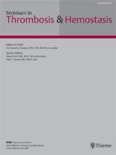
SEMINARS IN THROMBOSIS AND HEMOSTASIS
Scope & Guideline
Pioneering insights into hemostatic disorders since 1974.
Introduction
Aims and Scopes
- Thrombosis and Hemostasis Mechanisms:
The journal focuses on the underlying biological mechanisms of thrombosis and hemostasis, exploring the molecular and cellular pathways involved in coagulation, platelet function, and fibrinolysis. - Clinical Management and Guidelines:
It emphasizes practical clinical applications, including guidelines for diagnosis, treatment, and management of various coagulation disorders and thrombotic events. - Emerging Therapies and Technologies:
The journal highlights advancements in therapeutic approaches and diagnostic technologies, including gene therapy, novel anticoagulants, and point-of-care testing. - Epidemiological Studies and Risk Assessment:
Research in the journal addresses epidemiological aspects of thrombotic conditions, identifying risk factors, and assessing the impact of interventions on patient outcomes. - Translational Research:
SEMINARS IN THROMBOSIS AND HEMOSTASIS bridges the gap between laboratory findings and clinical practice, promoting research that translates into real-world applications for patients.
Trending and Emerging
- COVID-19 Related Thrombosis:
Research examining the thromboembolic complications associated with COVID-19 has surged, highlighting the need to understand the virus's impact on coagulation and management strategies. - Gene Therapy and Innovative Treatments:
There is a growing interest in gene therapy and other novel treatment modalities for inherited bleeding disorders and thrombosis, reflecting advancements in biotechnology and personalized medicine. - Multidisciplinary Approaches to Thrombosis:
Emerging studies emphasize interdisciplinary strategies that integrate insights from immunology, oncology, and genetics to address complex thrombotic conditions. - Patient-Centered Outcomes and Quality of Life:
Research focusing on patient-reported outcomes, quality of life, and the psychosocial aspects of living with thrombotic disorders is gaining traction, indicating a shift towards holistic patient care. - Machine Learning and Predictive Analytics:
The application of machine learning and predictive analytics for risk assessment and management of thrombosis is increasingly prominent, showcasing the integration of technology in clinical practice.
Declining or Waning
- Traditional Anticoagulation Methods:
There is a noticeable reduction in studies focusing solely on traditional anticoagulation methods, as the field shifts towards exploring more advanced therapies and personalized approaches. - Basic Research in Hemostasis:
Research that does not translate into clinical application or lacks direct relevance to patient care has seen a decline, as the journal emphasizes translational and applied research. - Historical Perspectives without Current Relevance:
Papers focused on historical accounts or perspectives without a clear connection to current clinical practices or advancements have become less frequent, reflecting a shift towards contemporary issues.
Similar Journals
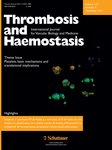
THROMBOSIS AND HAEMOSTASIS
Fostering Collaboration in the Global Hematology CommunityTHROMBOSIS AND HAEMOSTASIS is a prestigious journal published by GEORG THIEME VERLAG KG, dedicated to advanced research in the field of hematology. With an esteemed Impact Factor and recognized as Q1 in its category for 2023, the journal is regarded for its pivotal role in disseminating significant findings that contribute to our understanding of thrombosis and hemostasis. Since its inception in 1976, this journal has continuously published cutting-edge studies and reviews, making it a vital resource for researchers, healthcare professionals, and students alike. The journal’s commitment to high-quality research is reflected in its impressive Scopus Ranking of #18 out of 137 in Medicine - Hematology, placing it in the 87th percentile among its peers. Although not currently open access, THROMBOSIS AND HAEMOSTASIS remains an authoritative source for exploring novel therapeutic strategies and the latest scientific advancements in the field. Based in Stuttgart, Germany, this journal serves as a critical platform for sharing knowledge and fostering collaboration within the global hematology community.
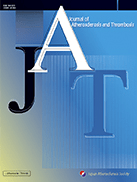
Journal of Atherosclerosis and Thrombosis
Advancing cardiovascular knowledge for a healthier future.Journal of Atherosclerosis and Thrombosis is a leading academic publication dedicated to advancing research in the fields of cardiovascular medicine, biochemistry, and internal medicine. Published by the Japan Atherosclerosis Society, this esteemed journal operates from its headquarters in Tokyo, Japan, and has been a vital resource in its area since its inception in 1994. With its robust impact in Cardiology and Cardiovascular Medicine, ranking in the top quartile (Q1) as of 2023, and a commendable standing in Internal Medicine and Biochemistry, the journal fosters an environment of innovation and discovery, showcasing significant studies and advancements that shape clinical practices and therapeutic approaches. Though not an open-access publication, it offers a wealth of insights to researchers, professionals, and students seeking to deepen their understanding of atherosclerosis and thrombosis. By continually featuring high-quality articles, the Journal of Atherosclerosis and Thrombosis plays an essential role in bridging the gap between research and practice, facilitating critical conversations that influence the future of cardiovascular health.

Revista Mexicana de Neurociencia
Fostering Interdisciplinary Insights in NeurologyThe Revista Mexicana de Neurociencia, published by the ACAD MEXICANA NEUROLOGIA, serves as a pivotal platform for the dissemination of research within the field of neurology and neuroscience. Although it was active from 2008 to 2014 and is no longer covered in Scopus, the journal still holds a significant place in the academic community, addressing critical topics relevant to both clinical and experimental neurology. With an emphasis on advancing knowledge in neuropsychology and public health, this journal targets researchers, professionals, and students alike, fostering an interdisciplinary dialogue that can enhance the understanding of neurological conditions within Mexico and beyond. As it stands, the journal is not open access, which may present challenges for accessibility, yet its affiliation with recognized academic standards underlines its commitment to quality research. This platform once provided insights that can inform practice and stimulate innovative approaches in the management of neurological disorders, underscoring its importance in the evolving landscape of neuroscience.
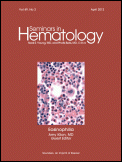
SEMINARS IN HEMATOLOGY
Exploring the Frontiers of Blood Disorders and Treatments.SEMINARS IN HEMATOLOGY, published by W B SAUNDERS CO-ELSEVIER INC, stands as a premier academic journal dedicated to the field of hematology. Established in 1964, this journal has built a robust reputation over its nearly six-decade history, now recognized as a Q1 journal in Hematology with an impressive impact factor reflective of its high relevance and citation frequency within the academic community. Residents and scholars can access meticulously curated articles that address innovative research, clinical practices, and advancements in the understanding of blood disorders and treatment methodologies. The journal, ranked #36 out of 137 in the Scopus Medicine Hematology category, showcases cutting-edge research, ensuring its contributions are crucial for professionals, researchers, and students striving to stay at the forefront of the hematology field. Although not an Open Access journal, SEMINARS IN HEMATOLOGY continues to unite a global audience dedicated to advancing the science and clinical practices in hematology.
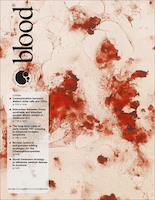
BLOOD
Shaping the Future of Hematological Discovery.BLOOD, published by the American Society of Hematology, is a premier peer-reviewed journal in the fields of Biochemistry, Cell Biology, Hematology, and Immunology. With an impressive impact factor and ranking in the top quartiles (Q1) across multiple disciplines, BLOOD is essential reading for researchers and professionals seeking to stay updated on the latest advancements in hematology and related fields. The journal has been a cornerstone of hematological research since its inception in 1946, providing a platform for rigorous scientific inquiry and discourse. Its commitment to publishing high-quality original research, comprehensive reviews, and insightful editorials makes it a vital resource for students, practitioners, and scientists alike. By offering exceptional access to influential publications, BLOOD continues to shape the future of hematology and enhance understanding of blood-related disorders, marking its vital role in advancing both basic and clinical research.

JOURNAL OF THROMBOSIS AND THROMBOLYSIS
Elevating discourse in cardiovascular medicine.JOURNAL OF THROMBOSIS AND THROMBOLYSIS, published by Springer in the Netherlands, serves as a vital platform for research in the fields of Cardiology and Cardiovascular Medicine and Hematology. With an impressive impact factor, this journal ranks in the Q2 category for both fields according to the latest metrics, evidencing its significant influence and contribution to ongoing scholarly discourse. Spanning over three decades from 1994 to 2024, the journal provides an essential source for innovative studies, clinical practices, and comprehensive reviews related to thrombosis and thrombolysis. Researchers, clinicians, and students alike will find valuable insights and cutting-edge knowledge that address the complexities of blood coagulation and its implications in cardiovascular health. The journal is indexed in Scopus, with commendable rankings, further establishing its reputation in the academic community.
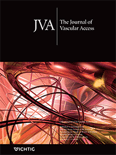
Journal of Vascular Access
Bridging theory and practice in vascular access.Journal of Vascular Access, ISSN: 1129-7298, E-ISSN: 1724-6032, is a renowned academic journal published by SAGE Publications Ltd, based in the heart of England. Esteemed in the fields of Nephrology and Surgery, this journal holds a commendable position in the academic community with a Q2 ranking in both disciplines as of 2023. With a Scopus rank reflecting its influence—162 out of 551 in Surgery and 40 out of 81 in Nephrology—the journal fosters scholarly discussions and disseminates groundbreaking research from 2001 to its latest developments in 2024. Although it is a traditional outlet, the journal's commitment to enhancing vascular access practices makes it invaluable for researchers, healthcare professionals, and students aiming to stay abreast of emerging trends and innovations in patient care. This vital resource supports the advancement of clinical practices and research, bridging the gap between theory and real-world application.
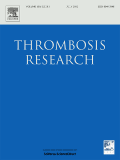
THROMBOSIS RESEARCH
Elevating Hematology Through Rigorous ResearchTHROMBOSIS RESEARCH is a leading peer-reviewed journal in the field of hematology, published by PERGAMON-ELSEVIER SCIENCE LTD. With an impressive impact factor and ranked within the top 10 of 137 in its category according to Scopus, this journal provides a critical platform for the dissemination of innovative research related to thrombosis and hemostasis. Established in 1972, THROMBOSIS RESEARCH has been at the forefront of scholarly communication, addressing key issues, findings, and advancements over more than five decades. Recognized for its high-quality content, the journal is categorized in the Q1 quartile for 2023, reflecting its influence and relevance within the scientific community. Researchers, medical professionals, and students engaged in the study of blood disorders will find valuable insights and the latest discoveries within its pages. Although currently not an open-access publication, THROMBOSIS RESEARCH remains accessible to a wide audience through institutional subscriptions, ensuring that vital research continues to inform and enhance clinical practices around the globe.
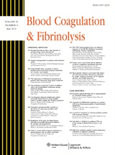
BLOOD COAGULATION & FIBRINOLYSIS
Transforming Understanding of Blood DynamicsBLOOD COAGULATION & FIBRINOLYSIS, a distinguished journal in the field of hematology, is published by Lippincott Williams & Wilkins, a reputable name in academic publishing. Since its inception in 1990, this journal has been committed to advancing the understanding of blood coagulation and fibrinolysis, focusing on the molecular mechanisms, clinical implications, and therapeutic aspects of these critical processes. With an impact factor reflecting its significance within the academic community, currently ranking Q3 in both Hematology and Miscellaneous Medicine for 2023, this journal serves as a pivotal platform for researchers and professionals alike. By providing access to cutting-edge research and reviews, BLOOD COAGULATION & FIBRINOLYSIS endeavors to foster collaboration and innovation in the treatment of coagulation disorders. Interested readers can explore ongoing contributions to the field through subscriptions and institutional access options.
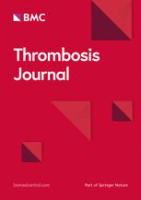
Thrombosis Journal
Fostering collaboration in thrombotic disorder research.Thrombosis Journal is a pioneering open-access publication offering critical insights into the field of hematology, contributing significantly to the understanding of thrombotic diseases. Published by BMC since its inception in 2003, this journal stands out with its commitment to accessibility and dissemination of research, ensuring that valuable findings are readily available to the global scientific community. With an impressive Q2 ranking in the Hematology category as of 2023, the journal boasts a notable presence in the Scopus rankings, positioned at Rank #73/137 in its field. Researchers, healthcare professionals, and students can benefit from a rich array of articles that encompass clinical studies, reviews, and innovative methodologies, all aimed at advancing knowledge and fostering collaboration in the field. The journal is headquartered in the United Kingdom, and its open-access model has enabled a diversity of perspectives and research innovations to flourish, solidifying Thrombosis Journal as an essential resource for those dedicated to combating thrombotic disorders.